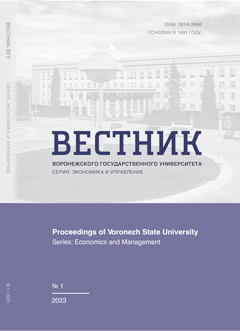Умный университет: справедливое распределение студентов по учебным профилям
Аннотация
Предмет: Одним из этапов реализации информационной системы «Умный университет» в Санкт-Петербургском государственном экономическом университете, цель которой – повышение эффективности и качества обучения в университете посредством автоматизации различных процессов, является разработка математической модели, позволяющей оптимизировать процесс распределения студентов по учебным профилям.
Цель: Статья посвящена математической постановке задачи поиска справедливого распределения студентов по учебным профилям с учетом их предпочтений и успеваемости.
Метод: Модель разработана на базе двусторонних рынков вида один на много, вводится понятие стабильности, а также конфликтов для рассматриваемого типа рынка.
Результаты: Апробация произведена на полномасштабных данных СПбГЭУ при распределении студентов на профили направления «Экономика». Числовые результаты демонстрируют возможность использования модели для решения поставленной задачи, наличие минимального количества конфликтов.
Литература
Ивахненко, Д. А. (2021). Применение моделей двусторонних рынков в задаче распределения учебной нагрузки между преподавателями кафедры. Современная экономика: проблемы и решения, 9, 16–28. [Ivakhnenko, D. A. (2021). Application of Two-Sided Market Models in the Problem of Distributing the Teaching Load Between Teachers of the Department. Modern Economics: Problems and Solutions, 9, 16–28. (In Russian).] https://doi.org/10.17308/meps.2021.9/2667
Мину, М. (1990). Математическое программирование. Теория и алгоритмы. Москва, Наука. [Minu, M. (1990). Mathematical programming. Theory and algorithms. Moscow, Nauka Publ. (In Russian).]
Bir, P., Fleiner, T., Irving, R. W., & Manlove, D. F. (2010). The College Admissions problem with lower and common quotas. Theoretical Computer Science, 411(34–36), 3136–3153. https://doi.org/10.1016/j.tcs.2010.05.005
Boehmer, N., & Heeger, K. (2022). A Fine-grained View on Stable Many-to-one Matching Problems with Lower and Upper Quotas. ACM Transactions on Economics and Computation, 10(2). https://doi.org/10.1145/3546605
Charnes, A., & Cooper, W. W. (1962). Management Models and Industrial Applications of Linear Programming. New York, John Wiley and Sons.
Diebold, F., & Bichler, M. (2017). Matching with indifferences: A comparison of algorithms in the context of course allocation. European Journal of Operational Research, 260(1), 268–282. https://doi.org/10.1016/j.ejor.2016.12.011
Fleiner, T., & Kamiyama, N. (2016). A matroid approach to stable matchings with lower quotas. Mathematics of Operations Research, 41(2), 734–744. https://doi.org/10.1287/moor.2015.0751
Fragiadakis, D., Iwasaki, A., Troyan, P., Ueda, S., & Yokoo, M. (2015). Strategyproof matching with minimum quotas. ACM Transactions on Economics and Computation, 4(1). https://doi.org/10.1145/2841226
Gale, D., & Shapley, L. S. (2013). College admissions and the stability of marriage. American Mathematical Monthly, 120(5), 386–391. https://doi.org/10.4169/amer.math.monthly.120.05.386
Hylland, A., & Zeckhauser, R. (1979). The Efficient Allocation of Individuals to Positions. Journal of Political Economy, 87(2), 293–314. https://doi.org/10.1086/260757
Irving, R. W. (1994). Stable marriage and indifference. Discrete Applied Mathematics, 48(3), 261–272. https://doi.org/10.1016/0166-218X(92)00179-P
Kamada, Y., & Kojima, F. (2015). Efficient matching under distributional constraints: Theory and applications. American Economic Review, 105(1), 67–99. https://doi.org/10.1257/aer.20101552
Manlove, D. (2013). Algorithmics of Matching Under Preferences. World Scientific. https://doi.org/https://doi.org/10.1142/8591
Manlove, D. F., Irving, R. W., Iwama, K., Miyazaki, S., & Morita, Y. (2002). Hard variants of stable marriage. Theoretical Computer Science, 276(1–2), 261–279. https://doi.org/10.1016/S0304-3975(01)00206-7
Monte, D., & Tumennasan, N. (2013). Matching with quorums. Economics Letters, 120(1), 14–17. https://doi.org/10.1016/j.econlet.2013.03.007
Roth, A. E. (1986). On the Allocation of Residents to Rural Hospitals: A General Property of Two-Sided Matching Markets. Econometrica, 54(2), 425-427. https://doi.org/10.2307/1913160
Roth, A. E. (2008). Deferred acceptance algorithms: History, theory, practice, and open questions. International Journal of Game Theory, 36(3–4), 537–569. https://doi.org/10.1007/s00182-008-0117-6
Rothblum, U. G. (1992). Characterization of stable matchings as extreme points of a polytope. Mathematical Programming, 54(1–3), 57–67. https://doi.org/10.1007/BF01586041

Это произведение доступно по лицензии Creative Commons «Attribution» («Атрибуция») 4.0 Всемирная.























